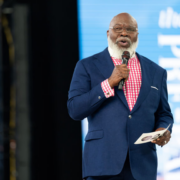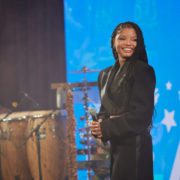At 29 years old, two-time Olympic boxing champion Claressa Shields is already the subject of a biopic.
“It’s a weird feeling,” Shields tells HuffPost, “because everybody gets their biopic when they’re retired or done doing whatever they’re doing, not in the midst of their career.”
“It’s one of those things where I’m like, ‘Wow, whoever would’ve expected this to happen?’” she adds. “Everybody’s like, ‘Are you going to have another movie?’ And I’m just like, ‘Of course, duh.’ This one is just so unique.”
“Unique” is the perfect word to describe Shields’ remarkable journey to becoming one of the greatest women boxers of all time, despite the hardships she endured even after achieving success. Growing up the daughter of a single mother in Flint, Michigan — a city historically plagued with environmental and civic injustices — Shields, nicknamed “T-Rex” for the powerful punches her short arms pack, learned firsthand how to prevail in the face of adversity.
That trait has defined much of her career, from amateur boxing to qualifying for the 2012 Olympic trials to winning her first gold medal for boxing on the world stage (the first American woman to do so) at age 17. However, the biggest fight of Shields’ life didn’t begin until after her extraordinary victory.
That’s the little-known story that “The Fire Inside” tasks itself with telling.
The movie, written by Oscar-winning filmmaker Barry Jenkins and directed by veteran cinematographer Rachel Morrison (“Black Panther,” “Mudbound”), follows Shields (played by “Star” breakout Ryan Destiny) from the start of her boxing aspirations as a youth — when she met her tough-love coach, Jason Crutchfield (Brian Tyree Henry) — to rousing Olympic matches to the perils she faced back home after receiving no endorsement deals for her hard work in the ring.
Destiny, 29, rises to the occasion to portray Shields in the film, a feat she wasn’t 100% sure about, although the boxer insists the actor represented her on screen well.
“Listen, [Destiny] exceeded my expectations,” says Shields. “I was very, very, very, very happy with her performance. Her boxing, her mannerisms outside the ring, her confidence, her attitude. She is just so great at what she does, and I’m happy that I trusted her and knew that she would embody my part.”
The 2015 documentary “T-Rex: Her Fight for Gold” explored parts of Shields’ story as she pursued her second Olympic competition at the 2016 Rio de Janeiro Games. However, “The Fire Inside” focuses on the nuances that make the boxer’s entire sports journey a heartening tale.
“I would describe it as an inspirational sports movie until it becomes an inspirational life movie,” Morrison says of her “meaningful” directorial debut.
The downbeat film, roughly five years in the making, is nothing like your typical sports biopic. It’s honest about showing Shields’ rough upbringing and how she went from reigning champion to cast-aside underdog. The movie’s fight scenes are a thrill, but they aren’t the sole focus. The real galvanizing moments come from the boxer relentlessly fighting through countless obstacles after her gold medal win — from her neglected home to the pitfalls of sports marketing — to get the monetary payoff and recognition she deserves.
At its core, “The Fire Inside” shines as a sports drama with a refreshing outlook on the harsh realities women athletes face every day. With Shields’ story front and center, the hope is that the world will finally celebrate her as the trailblazer she is.
“I feel very validated that it seems like [the movie] is really affecting people and that they’re on the ride with us,” Morrison says, “and, hopefully, feel like they’ve walked a mile in Claressa’s shoes.”
HuffPost spoke to Destiny, Morrison and Shields about the making of their movie, bringing more awareness to the boxer’s life story and the impact they hope to have.
Sabrina Lantos/Amazon MGM Studios
I love that “The Fire Inside” is not your average sports movie, where every moment is leading up to a big win. We get to actually see Claressa’s life before, during and after Olympic success, and what her reality was as a star female boxer who still struggled to get support and endorsements afterward. Why was it important to tell that part of her story?
Rachel Morrison: To tell her story at all was important because I didn’t know her story, and so many other people didn’t know her story, but it’s a story that deserves to be known. I was particularly drawn to the fact that we get to upend the typical sports biopic constructs and say so much more. Because nobody gets to stay on top, and for women, especially Black women, even to make it to the top, you don’t necessarily get all the things.
And so the real heart of the film is what happens after the win, and the resilience and strength and perseverance it took for her to get back up and keep fighting. That’s almost more inspiring than the athleticism. I mean, they’re both incredibly inspiring, but most of us are never going to be professional athletes in our lives. [However], we can relate to this idea of, “You don’t stay down, and you get up and you keep fighting and you do it because you love the sport or you love your craft. You push through all the noise, or the lack of noise, and keep fighting for everything you deserve.”
Claressa served as an executive producer on the film. Did you let her creative input guide the direction at all?
Morrison: Somewhat. Barry and I brought Claressa the first draft of the script, mostly to get her sign-off on the sensitive material and make sure we could talk her through how we were gonna handle it, including some elements of her backstory. She had a few notes, but she was incredibly trusting and gave us a lot of space and freedom. We brought her back at the end, and I don’t think there was ever a moment that I was more nervous than showing her [the film]. Thankfully, she loved it, and that was the validation. That’s all that mattered, really. Obviously, I hope the world loves it, too, but the real thing that mattered was making sure that it felt authentic to Claressa’s experience.
Claressa, the movie takes a very candid look at the hardships you endured after winning your first Olympic gold medal. Were you at all nervous about people seeing those sensitive moments of pain and strife in your life?
Claressa Shields: No, I was not. I didn’t want my life to be a secret. I want them to see how hard it was for me, how tough it was for me. I want them to see me lose my first fight and cry. Throughout the movie, I’m so tough and resilient and confident, and then I lose, and then you see this other person, and you see me come back and be more resilient, more confident and believe in myself even more. So I want them to see that everybody don’t bounce back like that. Everybody can get up when they fall. I got up, and I won a gold medal. And then I had to go through not getting any endorsement and sponsorships and then having another fall. That tugged at me emotionally all the time, made me think about my self-worth, question if I was pretty or not, if I was as special and great as I thought I was in women’s boxing. It hurt my feelings a lot, so the fact that I was able to get through that, I was like, “OK, this is good, and I’m happy that I kept going.”
There are some hard parts [of my story], but I wanted them to put everything in [the movie]. So when I read the script… I was like, “You know what, we’re not going to shy away from the painful stuff. We’re going to embrace it, so they can feel what I had to go through.”

Sabrina Lantos/Amazon MGM Studios
Rachel, Ryan Destiny and Brian Tyree Henry both give amazing performances in the film. Talk about what it was like directing them.
Morrison: So Ryan, obviously, was new to the feature experience. She and I have been partners in this for a long time and had a very similar hope and vision for it. We were both pushing ourselves out of our comfort zones, doing something we hadn’t done before, so we were very supportive and encouraging of one another. I saw the performance in her audition; it was amazing. She really made herself undeniable in that room, but she hadn’t been an athlete. At one point, I think I was naively looking for really great actors who had athletic backgrounds, or really great athletes who could maybe act, but that was never gonna work. So once I let that go, I basically made [Destiny] swear like, “Are you gonna commit?” I mean “Christian Bale” commit, like, “We’re going there.” And she really did. It’s such a testament to her.
And then [with Henry], there was a real alliance with all three of us: a camaraderie and symbiosis. [His and Destiny’s] chemistry was magnetic, which is such a gift because you can’t script that. So, to see them really catch fire as coach and fighter but also as humans was pretty special. And Brian, I’ve been such a fan of his for so long. He can do no wrong in my eyes, and he’s so charismatic. He often plays these larger-than-life characters, and this was a chance to be a real human who’s relatable and subdued. To see him as a father and teacher, too, again, he does so much with so little. Just letting him do his thing and giving him a safe place to do it and encouraging him was such a gift.
Ryan, at the beginning of this film’s process, you had doubts that you’d even get this role. So what did your fight look like, getting over those nerves and finding that confidence within to portray Claressa?
Ryan Destiny: It always depended on the day itself and what I’d be filming, whether it be a fight or a scene or both, and having to make sure I was in the right mindset for whatever I needed to execute that day. ’Cause not every day is this super confident thing. Sometimes, it was vulnerable. Sometimes it was angry. So it just varied all the time. I really took it day by day, and whatever was asked of me, I tried to make sure I was open and present and definitely taking the direction I needed from Rachel and feeding off of whoever I was in the scene with, and just trying to make it as grounded as possible.
You said in one interview that a boxer’s confidence is much different than a normal person’s confidence. How did you discover that?
Destiny: Ooh, I think it was this thing called acting, ’cause I definitely… I still don’t think I have exactly what [Shields] has in her day-to-day life. But it was about taking the little bit of confidence that I would have on whatever day ― sometimes it’d be bigger or smaller — and maximizing that and trying to make sure that I knew in whatever moment it was, I could see it and feel her spirit and think about what she would do in those moments to execute to the best of my ability. I think, overall, I did that, and I’m happy with how it turned out, but it was definitely not a walk in the park every day.

Sabrina Lantos/Amazon MGM Studios
Biopics come with a great deal of responsibility, because you have the task of portraying the nuances of someone else’s life story. Did that scare you initially?
Destiny: It did. It definitely had a lot of challenges in general, and I think the entire project itself was just scary. Me having to play this person who’s still alive, who’s this beast in her own right and the greatest at what they do. Also, having to come in with these people that have accomplished so much. I was in awe of Rachel, Brian and Barry Jenkins, and having to step into this space where I felt so new in a sense, even though I’ve been doing this for such a long time now. So it was all very scary in different ways, but that wasn’t a bad thing for me. Me feeling that way is something that I like, because it represents growth. So it was something that I took as a good thing, feeling all of the fear in me but turning it into something.
You had a bit of an advantage, being able to pick Claressa’s brain and talk to her about your portrayal. How was that ― leaning on her to ensure you captured all the details of her story?
Destiny: It was amazing. She was a really open book with whatever I needed to ask her, and I’m just thankful for that. Because it’s one thing to have the footage and all these different sources online that I could go to — which were very, very helpful — but it’s also great to actually get it from the source herself.
The most important thing that I wanted to make sure I understood were the relationships that she had with her family, in particular her mother, and making sure I captured the essence of that and understood it. It’s something that is so complex that, I think, sometimes we don’t always understand, so I wanted to hear from her how she felt about her [mother] during that time in her life and how she feels currently. It was so helpful to also have the footage in the [“T-Rex”] documentary, because I am playing her at 16, 17 [years old], not her now. And who she was versus who she is today are very different. It was a balance between the two, for sure, but I’m so glad that I had her as well.
You had months of boxing training to prepare for the film. How intense was that?
Destiny: It was maybe around six or seven months of training. The first time I went in, it was before the pandemic, and I trained for about three, four months, and then I had to do it all over again in 2022. So that was also another three, four months, and each time was different. The first time, I did it with my boxing trainer only. The second time, I was with my boxing coach and doing weight training as well. So, having to balance the two was just another challenge that I was not used to.
I definitely shocked my body, and it was really cool to see it transform the way that it did. [From] me not being able to do a pushup to being able to do like 20, 50, it was insane. It was a new experience of having to push myself mentally for the physical [training], and it was a very important part that I needed to go through. Having my boxing coach treat me like a fighter and not an actor was also very helpful for the entire project itself.

Sabrina Lantos/Amazon MGM Studios
What has this experience taught you about yourself?
Destiny: I’ve walked away from it with a new confidence in myself and a new perspective on life and how I need to continue to walk through it. I have to thank Claressa herself for that. She has inspired me since before I even met her in learning about her story. But then meeting her and seeing her spirit and how she goes about a lot of things when it pertains to her career, herself, her family, her community, whatever it may be, is something that’s changed me literally for the better for the rest of my life. I hold that very, very dear to me, because it’s something that I really needed at that time in my life, and this project as a whole has just changed me.
We Need Your Support
Already contributed? Log in to hide these messages.
Why do people need to see this film?
Morrison: For Black women, they need to see this film so they can see themselves, and young girls can see a version [of themselves] that’s so inspiring. It’s so rare that Black women get to be strong and resilient on screen, and [Claressa], what she was able to accomplish in life, what she was able to fight for, we need to see ourselves to know that it’s possible. Just look at our election: People can’t picture it because they don’t get to see it. So it’s so important and validating [to see this movie], and I think for everybody else, they need to see it to build that empathy, so they can understand what it’s like to not necessarily be given all the things.
Shields: People should go see “The Fire Inside” because it is a very inspirational, very encouraging story. It’s a story about resilience from a young Black girl who comes from Flint, Michigan, who went through poverty, sexual abuse, being overlooked and not being respected. So, if you want to see somebody get knocked down and get back up… if you want to understand who Claressa Shields is and how she got to where she is now, then this is the movie you want to see.
“The Fire Inside” hits theaters Dec. 25.











Comments